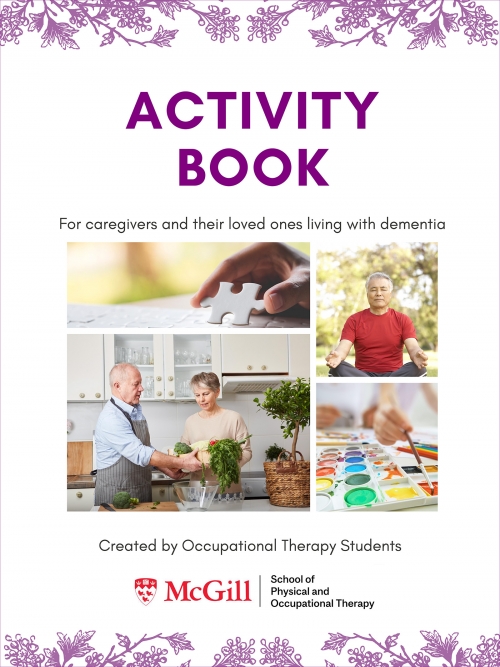Dementia Education Program Newsletter
 When the COVID-19 pandemic hit, it became necessary for the McGill School of Physical and Occupational Therapy to offer alternative clinical learning experiences for their students. This challenge became an unexpected opportunity to help meet the needs of community partners as the students turned to the online world with the goal of creating projects that would be relevant and useful for their clients.
When the COVID-19 pandemic hit, it became necessary for the McGill School of Physical and Occupational Therapy to offer alternative clinical learning experiences for their students. This challenge became an unexpected opportunity to help meet the needs of community partners as the students turned to the online world with the goal of creating projects that would be relevant and useful for their clients.
For their final project in the new Health Innovator Student Incubator Engines clinical course, graduate occupational therapy students Nicole Drinkwater, Emma Vadot, Madde MacDougall and Chrissy MacDonald developed an activity booklet for caregivers and their loved ones who are living with dementia, under the supervision of Marie-Eve Bolduc, Assistant Professor (Professional) at the School of Physical and Occupational Therapy. They worked together to create a detailed guide that would encourage individuals to engage in the activities that they enjoy, aligned with their interests and abilities, in order to contribute to their sense of self, promote creativity and add to their quality of life.
The end result is a very engaging virtual toolkit that offers over 40 recreational activities, in six different categories, with instructions on how to adapt the activities to the needs of the individual.
THIS FREE ACTIVITY BOOKLET IS AVAILABLE IN BOTH FRENCH AND ENGLISH.
Download the Dementia Activity Booklet in English.
Consult the online Dementia Activity flipbook in English.
Thank you to both Dialogue McGill (funded by Health Canada) and to the McGill Dementia Education Program for funding the French translation of this booklet.
WHY ACTIVITIES ARE IMPORTANT:
Engaging in meaningful activities is important for individuals of all ages. For individuals with dementia, it is important for them to continue engaging in the activities that they enjoy by making suitable adaptations. Aligning activities with a person’s interests and abilities will contribute to their sense of self, promote creativity and add to their quality of life.
USING THIS BOOK:
In the following book, we have proposed 40+ activities that you and your loved one can engage in and enjoy together. For each activity, the target and steps, materials required and ways to adapt it to the individual ’s abilities are described. As a caregiver, you should do these activities with your loved one as it will be important to support them, ensuring they are safe. Consider the time of day that you chose to engage in each activity as you want to select a time when your loved one is most alert. These activities all vary in length, and can be done in steps over multiple days. If needed, ensure your loved one is wearing their glasses and hearing aids before you start. Take note that even just having your loved one present can promote well-being. We hope these activities bring you joy!
 MEET THE STUDENTS WHO WORKED ON THIS PROJECT:
MEET THE STUDENTS WHO WORKED ON THIS PROJECT:
HEALTH INNOVATOR STUDENT INCUBATOR ENGINES
In spring 2020, the COVID-19 pandemic necessitated the rapid creation of alternative clinical learning experiences for the 70 professional master’s occupational therapy students heading into their summer term at McGill University. For students, this summer term usually consists of the first two full-time clinical courses or approximately 50% of their required program clinical learning experiences. Since public institutions and private rehabilitation clinics were essentially closed to occupational therapy students at this time to contain the pandemic spread and respect Ministry of Health directives, the first six-week clinical course was replaced by the McGill designed “Health Innovator Student Incubator Engines” (HISIE) clinical course. This was an unexpected opportunity to help meet the needs of community partners as they scrambled to an online world for their clients.
Supervision and instruction for the new HISIE course were provided virtually by three occupational therapy clinical faculty members (C. Storr, K. Falcicchio and V. Watters) along with diverse expert consultations within the community and associated faculty contacts. The conceptual course redesign of this first clinical course (HISIE) included creating three over-arching course practice themes with incubator engines or community partnership projects along with corresponding innovative, individual, weekly learning content. The three practice themes included: emerging roles for occupational therapists in Quebec; telehealth and remote services in rehabilitation; and knowledge translation and education. For each of the 15 different projects or incubator engines, students created a clear project description, developed a needs analysis, created the project, presented the final presentation to their team and stakeholders and have continued to ensure project uptake. This project is one such incubator engine under the knowledge translation/education theme.
